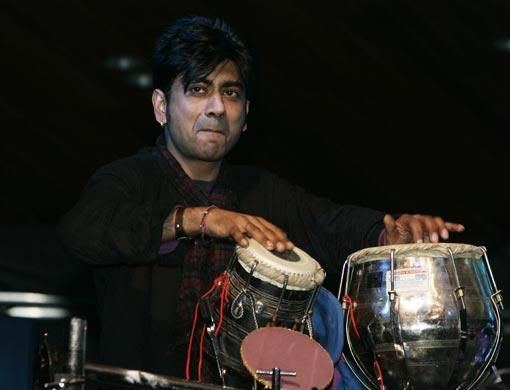Growing up in England, the son of immigrant Indian parents who had fled Idi Amin's ethnic cleansing in Kenya, Talvin Singh was always straddling many cultures.
He went to India at 15, to train in classical tabla. On his return, Singh collaborated with various Western bands such as Bjork and The Future Sound of London. He founded Anokha, a London nightclub where Asian DJs and bands played with Singh's percussion. Talvin's eclectic mix of Asian and Western music attracted a cult following. For this percussionist-DJ-composer-artist, music knows no boundaries of culture or language.
Successful
Talvin's Dubai show capped a memorable month of concerts in Istanbul, a successful art show in Mumbai of his video and sound installations, a birthday spent with his mentor Ustad Zakir Hussain, and a highly successful publicity exercise for
his latest assignment, music for the epic serial Mahabharat, to be telecast soon on Star TV.
It's easy to pick him out in a crowded lobby, thanks to his remarkable punk bouffant. Friendly and down to earth, this
Mercury Prize-winner talks about the perils of being a pioneer, making music with the likes of Madonna, and turning
unapologetically mainstream.
How was your experience of performing at the Dubai show?
We didn't change the music, the repertoire was still the same — the sound and energy was different. It was loud like a rock
concert. The audience was new to our kind of sound. Atif Aslam is really big, and young Asians love him. He has a positive
energy, that's not just about his music, but flows from him, people love it.
Do you think it's important to be as accessible in your music , like Atif is?
In a sense, yes. Indian music when it comes to social and cultural norms, is not really accepted by normal professional
families. They are usually quite discouraging when it comes to taking up music as a profession, because of the negative
connotations it carries. People like Atif actually help making it a part of our life.
I was brought up in a Sikh family. My parents discouraged me from taking up music because they wanted me to be true to my profession.
What difference did winning the Mercury Prize make to your life?
The record company wanted me to start making pop music, when I had actually won the award for a different reason. I left the company. The contract in a creative partnership doesn't mean anything if the relationship is gone.
Do you think IT is really going to change the business? Is it the death of record companies?
There are two sides to the business today, a strong divide. There's music for ring tones, digital tracks that can be free or
paid. Everyone has an iPod, with 3,000 tracks — a box of chocolates, and not a full meal. There are three artistes I know who are only famous because of their MySpace profiles. It's just virtual fame.
And then there's live music, which actually has more value than recorded music today. Everyone wants to do live events.
That's good for artists who are more performers and can play live.
What's in the pipeline for you now?
I am doing the music for Mahabharat, which is going to be a feature film, TV serial and gaming. I will compose and direct all the music.
I am thinking of starting a virtual band, just four characters. But right now it's pretty difficult to fit anything in my schedule. I have to be very selective about the projects I take up.












